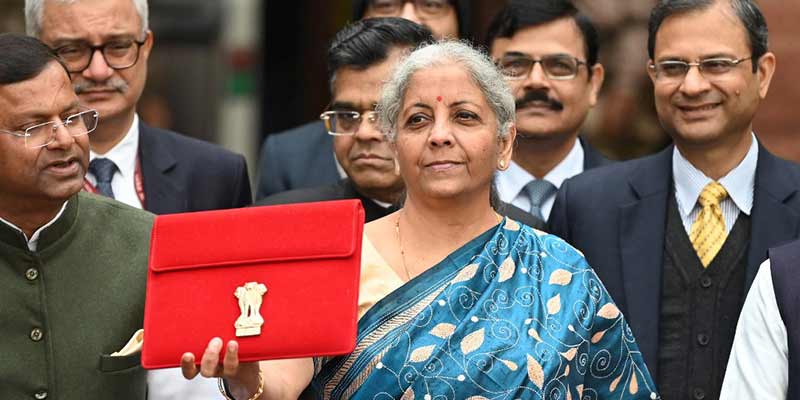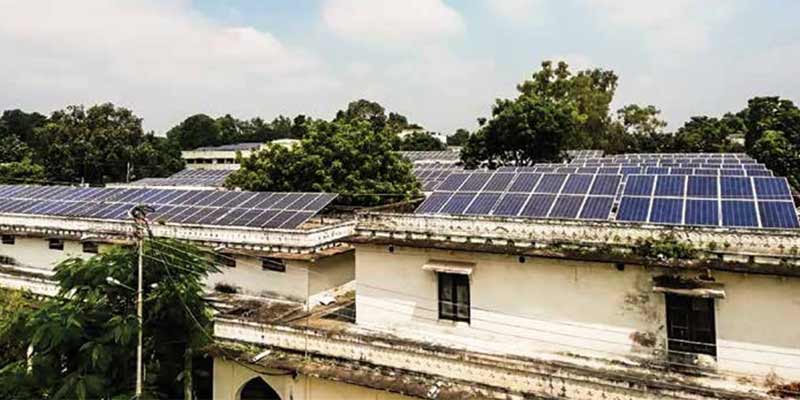- India
- Feb 01
Sitharaman unveils ‘Amrit Kaal’ strategy in Interim Budget 2024-25
Union Finance Minister Nirmala Sitharaman, in her pre-election Budget, which is technically a ‘vote on account’ and popularly termed an Interim Budget, said the Indian economy has witnessed a profound positive transformation in the last 10 years.
Sitharaman presented her sixth straight Budget ahead of the Parliamentary elections, matching the record of former Prime Minister Morarji Desai. Morarji Desai presented two interim Budgets, one in 1962 and other in 1967. Desai has the distinction of presenting six Budgets in a row. He had presented a total number of 10 Union Budgets.
In the Budget Speech, Sitharaman unveiled a strategy for ‘Amrit Kaal’.
She said that guided by the principle ‘Reform, Perform, and Transform’, the government will take up next generation reforms, and build consensus with the states and stakeholders for effective implementation.
Key elements of the strategy:
1) Infrastructure and Investment
• Three major economic railway corridor programmes will be implemented.
They are:
i) Energy, mineral and cement corridors
ii) Port connectivity corridors
iii) High traffic density corridors.
The projects have been identified under the PM Gati Shakti for enabling multi-modal connectivity. They will improve logistics efficiency and reduce cost.
• To encourage sustained foreign investment, the government is negotiating bilateral investment treaties with our foreign partners, in the spirit of ‘first develop India’.
• The number of airports have doubled to 149 in the past 10 years. Roll out of air connectivity to tier-two and tier-three cities under UDAN scheme has been widespread. Expansion of existing airports and development of new airports will continue expeditiously.
• Metro Rail and NaMo Bharat can be the catalyst for the required urban transformation. Expansion of these systems will be supported in large cities focusing on transit-oriented development.
2) Inclusive Development
• Government assists the states in faster development of aspirational districts and blocks, including generation of ample economic opportunities.
• Despite the challenges due to COVID-19, implementation of PM Awas Yojana (Grameen) continued and the government is close to achieving the target of three crore houses. Two crore more houses will be taken up in the next five years to meet the requirement arising from increase in the number of families.
• The government will launch a scheme to help deserving sections of the middle class living in rented houses, or slums, or chawls and unauthorized colonies to buy or build their own houses.
3) Health
• The government will encourage vaccination for girls in the age group of 9 to 14 years for prevention of cervical cancer.
• Various schemes for maternal and child care will be brought under one comprehensive programme for synergy in implementation. Upgradation of anganwadi centres under “Saksham Anganwadi and Poshan 2.0” will be expedited for improved nutrition delivery, early childhood care and development.
• The newly designed U-WIN platform for managing immunisation and intensified efforts of Mission Indradhanush will be rolled out expeditiously throughout the country.
• Healthcare cover under Ayushman Bharat scheme will be extended to all ASHA workers, anganwadi workers and helpers.
4) Sustainable Development
• Towards meeting the commitment for ‘net-zero’ by 2070, the following measures will be taken.
a) Viability gap funding will be provided for harnessing offshore wind energy potential for initial capacity of one giga-watt.
b) Coal gasification and liquefaction capacity of 100 MT will be set up by 2030. This will also help in reducing imports of natural gas, methanol, and ammonia.
c) Phased mandatory blending of compressed biogas (CBG) in compressed natural gas (CNG) for transport and piped natural gas (PNG) for domestic purposes will be mandated.
d) Financial assistance will be provided for procurement of biomass aggregation machinery to support collection.
• Pradhan Mantri Suryodaya Yojana will enable one crore families to get up to 300 units of free electricity every month and help them save up to Rs 18,000 annually. The rooftop solarisation scheme will also aid charging of electric vehicles, entrepreneurship opportunities for a large number of vendors for supply and installation and employment opportunities for the youth with technical skills in manufacturing, installation, and maintenance.
• The government will expand and strengthen the e-vehicle ecosystem by supporting manufacturing and charging infrastructure. Greater adoption of e-buses for public transport networks will be encouraged through payment security mechanism.
• For promoting green growth, a new scheme of bio-manufacturing and bio-foundry will be launched. This will provide environment friendly alternatives such as bio-degradable polymers, bio-plastics, bio-pharmaceuticals and bio-agri-inputs. This scheme will also help in transforming today’s consumptive manufacturing paradigm to the one based on regenerative principles.
5) Agriculture and Food Processing
• To ensure faster growth of the agriculture sector, the government will further promote private and public investment in post-harvest activities including aggregation, modern storage, efficient supply chains, primary and secondary processing and marketing and branding.
• After the successful adoption of nano urea, application of nano DAP on various crops will be expanded in all agro-climatic zones.
• A strategy will be formulated to achieve self-reliance for oil seeds such as mustard, groundnut, sesame, soybean, and sunflower. This will cover research for high-yielding varieties, widespread adoption of modern farming techniques, market linkages, procurement, value addition, and crop insurance.
• A comprehensive programme for supporting dairy farmers will be formulated.
• Implementation of Pradhan Mantri Matsya Sampada Yojana (PMMSY) will be stepped up to enhance aquaculture productivity from existing 3 to 5 tonnes per hectare, double exports to Rs 1 lakh crore and generate 55 lakh employment opportunities in the near future. Five integrated aqua parks will also be set up.
6) Tourism
• Tourism, including spiritual tourism, has tremendous opportunities for local entrepreneurship.
• States will be encouraged to take up comprehensive development of iconic tourist centres, branding and marketing them at global scale.
• A framework for rating of the centres based on quality of facilities and services will be established. Long-term interest free loans will be provided to states for financing such development on a matching basis.
• To address the emerging fervour for domestic tourism, projects for port connectivity, tourism infrastructure, and amenities will be taken up on our islands, including Lakshadweep. This will help in generating employment also.
Manorama Yearbook app is now available on Google Play Store and iOS App Store


